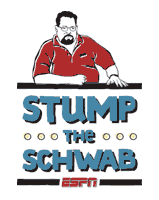Three contestants competed against "The Schwab" in a series of three rounds, with the lowest-scoring player being eliminated after each round.
Round 3: The Schwab Showdown
When there was just one contestant left, he and "The Schwab" faced off in a one-on-one battle. In this last round, there were four cleverly named categories, each of which dealt with one subject. For example, "Tough Guys" dealt with athletes named Guy, not actual tough guys. Each category had three different cards, each with a question on them. The first question in each category was worth one point, the second two, and the third three. Both the contestant and "The Schwab" were given a pass. If the contestant or "The Schwab" was unsure about an answer to a question, he passed it onto the other player. However, if that player or "The Schwab" still had their pass in possession, they could pass the question right back to the person it was first asked, who then had to answer it. Each incorrect answer was worth one strike, just like baseball, with three strikes ending the round immediately. The game was won either by outscoring the opponent after all questions were asked or by the other player striking out. If the contestant had more points than "The Schwab", then he had "stumped the Schwab."
Originally, the final round was called "The Big Deal", with questions worth 1, 3, and 5 points. Host Scott gave the players poker chips worth the point value of the question they answered correctly. He still placed strike markers in front of the contestant and "The Schwab" as they were accumulated.
In the first season, "stumping the Schwab" got a person a prize of tickets to a sporting event. If their "Schwab Showdown" score was good enough (whether or not they "stumped the Schwab"), they were invited back to participate in a tournament, where the grand prize was a job working alongside "The Schwab" in the research room at ESPN, or tickets for two to five major sports championships. But, that person again had to "stump the Schwab" to win that prize. No one won the grand prize.
In the second season, "stumping the Schwab" won a contestant $5,000 (equivalent to $8,000in 2024). The semi-finals was contested among those who won the bonus round or finished with a high enough score. Those nine players had a chance at another $5,000 prize in the "Schwab Showdown", as well as a chance at the Grand Championship. If they stumped him once more in the championship round, they won a grand prize of $25,000. Adam Garfield of Pennsylvania won season two. The finals came down to one question and "The Schwab" answered it correctly. Adam won a trip to the 2005 ESPY Awards in Los Angeles as a consolation prize.
In the third season, the contestant who made it to the "Schwab Showdown" earned $1,000 (equivalent to $1,600in 2024). If that contestant "stumped the Schwab", he earned an additional $5,000 and a guaranteed spot in the semifinals. If they "stumped the Schwab" in the semifinals, it was worth $15,000 (equivalent to $24,000in 2024). A finals win earned $30,000, so theoretically, a contestant won up to $53,000 ($1,000 for each of the game wins + $5,000 + $15,000 + $30,000). Once again, however, at the end of the season, "The Schwab" won the final "Schwab Showdown", defeating Pete Fierro.
The fourth and final season saw several scoring changes. The $1,000 for winning the game stayed intact through all the rounds, but a win in the "Schwab Showdown" in the first round only netted the contestant an additional $1,000. In the semifinals, that went up to $5,000 for a win in the "Schwab Showdown." In the championship show, the winner of the game played the "Schwab Showdown" for a cash jackpot which started at $9,000, and had money added to it every time "The Schwab" won the "Schwab Showdown." The pot, which reached $30,000, was not won, with "The Schwab" defeating Marty Asalone.
In an episode that aired on May 24, 2005, "The Schwab" struck out for the very first time in the show's history, losing to a senior at Johns Hopkins University named Stephen Shukie ("The Schwab" is an alumnus of St. John's University) in the first college edition of the show. "The Schwab" only scored two points (two correct one point answers) in the whole round, while his opponent scored just four. In the same episode, it was the first time that the contestants (Shukie of Johns Hopkins University, Alec Tolivaisa of Worcester Polytechnic Institute, and Jonathan Evans of Tulane University) and "The Schwab" swept an entire Leading Off category (current AFC Head Coaches) without an incorrect answer.
If there was a tie at the end of any of the three rounds, then Stuart Scott asked a tiebreaker question, where the answer was a number. The person closest to that number won.
